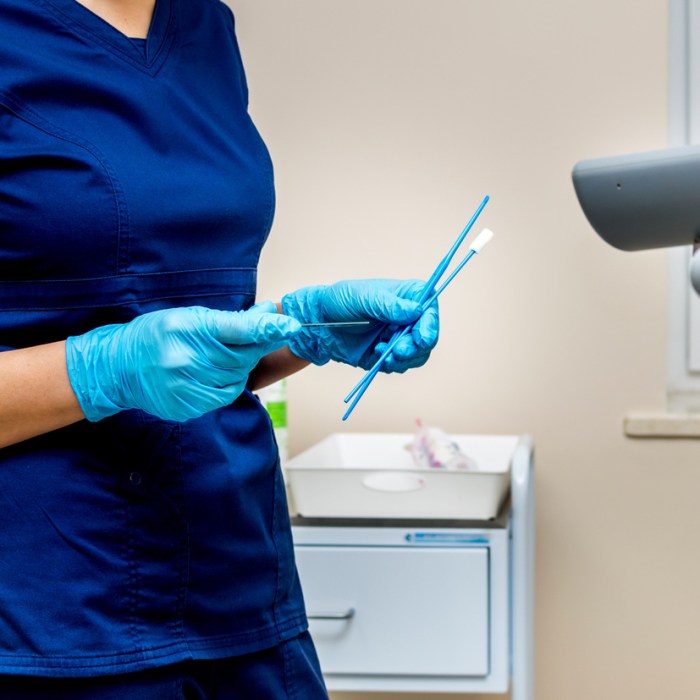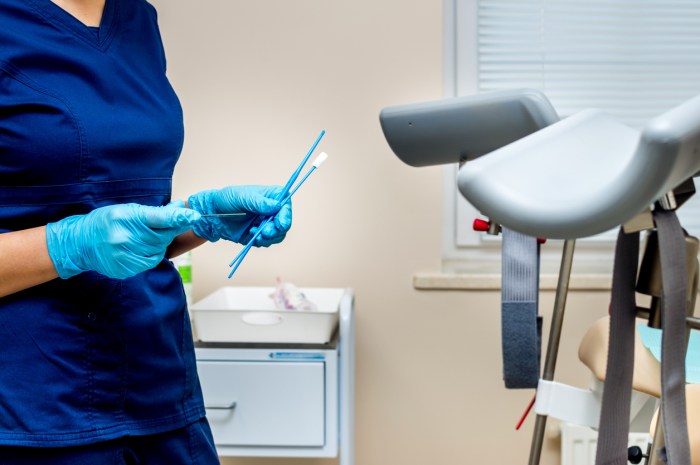Can you get a pap while on your period – Navigating the complexities of cervical cancer screening, the question of whether you can get a Pap smear while on your period often arises. This comprehensive guide delves into the potential risks, alternative testing methods, and patient considerations to help you make informed decisions about your cervical health.
Medical Implications
Getting a Pap smear during your period is generally not recommended due to potential risks and reduced accuracy of the results. Let’s delve into the medical implications and impact of menstrual blood on the procedure.
Risks
- Cervical bleeding:Menstruation can cause cervical bleeding, which can interfere with the visibility of the cervix and make it difficult for the healthcare provider to obtain a clear sample.
- False-negative results:Menstrual blood can dilute or obscure abnormal cells, leading to false-negative results. This means that potential cervical abnormalities may be missed.
- Discomfort:The insertion of the speculum and the collection of cells can be more uncomfortable during menstruation due to increased cervical sensitivity.
Accuracy
The accuracy of Pap smear results obtained during menstruation is compromised. Menstrual blood contains red blood cells, mucus, and endometrial cells, which can interfere with the interpretation of the Pap smear slide. This can lead to false-positive or false-negative results.
Impact of Menstrual Blood
Menstrual blood can affect the Pap smear procedure in several ways:
- Dilution:Menstrual blood can dilute the concentration of cervical cells in the sample, making it harder to detect abnormal cells.
- Obstruction:Blood clots or heavy menstrual flow can obstruct the view of the cervix, making it difficult to collect a representative sample.
- Contamination:Menstrual blood can contaminate the sample with endometrial cells, which can be mistaken for cervical cells and lead to false-positive results.
Alternative Testing Methods

When a Pap smear is not feasible due to menstruation, alternative methods for cervical cancer screening may be considered. These methods offer varying levels of accuracy and reliability compared to Pap smears, and each has its own advantages and disadvantages.
HPV Testing
- Accuracy:HPV testing detects the presence of human papillomavirus (HPV), which is responsible for most cervical cancers. It is highly sensitive and specific, but it does not provide information about the severity or stage of any precancerous or cancerous changes.
It’s a common question: can you get a pap while on your period? The answer is yes, but it’s not ideal. Your period can make it harder for the doctor to see your cervix clearly, which can make the pap less accurate.
If possible, it’s best to schedule your pap for a time when you’re not on your period. Similarly, if you’re wondering can you donate eggs if your tubes are tied , the answer is also yes. However, it’s important to talk to your doctor about the risks and benefits before making a decision.
- Reliability:HPV testing is a reliable method for detecting high-risk HPV strains that are associated with cervical cancer. However, it may not detect all cases of cervical cancer, especially in women who have been vaccinated against HPV.
- Advantages:HPV testing is non-invasive, can be self-collected, and provides long-term protection against cervical cancer if the result is negative.
- Disadvantages:HPV testing does not provide information about the severity or stage of precancerous or cancerous changes, and it may not detect all cases of cervical cancer.
Visual Inspection with Acetic Acid (VIA)
- Accuracy:VIA involves applying a vinegar solution to the cervix to highlight abnormal cells. It is less sensitive and specific than Pap smears or HPV testing, but it can be a useful screening method in resource-limited settings.
- Reliability:VIA is a reliable method for detecting large, visible precancerous lesions, but it may not detect smaller or less visible lesions.
- Advantages:VIA is non-invasive, inexpensive, and can be performed by trained healthcare providers.
- Disadvantages:VIA is less sensitive and specific than Pap smears or HPV testing, and it may not detect all cases of cervical cancer.
Visual Inspection with Lugol’s Iodine (VILI), Can you get a pap while on your period
- Accuracy:VILI involves applying a Lugol’s iodine solution to the cervix to highlight abnormal cells. It is similar to VIA in terms of accuracy and reliability.
- Reliability:VILI is a reliable method for detecting large, visible precancerous lesions, but it may not detect smaller or less visible lesions.
- Advantages:VILI is non-invasive, inexpensive, and can be performed by trained healthcare providers.
- Disadvantages:VILI is less sensitive and specific than Pap smears or HPV testing, and it may not detect all cases of cervical cancer.
Patient Considerations
During a Pap smear, the cervix is examined and cells are collected for analysis. Menstrual blood can interfere with this process, making it more difficult to obtain a clear sample. Therefore, it is crucial for patients to inform their healthcare providers about their menstrual status before undergoing a Pap smear.
Patients play a vital role in choosing the appropriate testing method. They can discuss their concerns and preferences with their healthcare provider to determine the best option for their individual circumstances.
Concerns and Misconceptions
Some patients may have concerns or misconceptions about Pap smears during menstruation. It is important to address these concerns and provide accurate information to ensure patients make informed decisions about their healthcare.
- Myth:Pap smears cannot be performed during menstruation. Fact:Pap smears can be performed during menstruation, but the results may not be as accurate as when performed at other times of the menstrual cycle.
- Myth:Pap smears are painful during menstruation. Fact:Pap smears may be slightly more uncomfortable during menstruation, but they are generally not painful.
- Myth:Pap smears are less effective during menstruation. Fact:Pap smears may be less effective during menstruation due to the presence of menstrual blood, but they can still detect cervical abnormalities.
Clinical Guidelines
Clinical guidelines for Pap smear scheduling in relation to menstruation vary among healthcare organizations. However, they generally recommend avoiding Pap smears during menstruation due to the presence of blood and mucus, which can interfere with the accuracy of the test.
If you’re wondering about the possibility of getting a Pap smear while menstruating, know that it’s generally not recommended. However, if you’re curious about the nutritional guidelines following a gastric sleeve procedure, you may find this resource helpful: how many calories should i eat after gastric sleeve . As for the Pap smear, it’s best to consult with your healthcare provider to determine the most suitable time for your individual circumstances.
The rationale behind these guidelines is to ensure that the Pap smear sample is clear of menstrual blood and mucus, which can obscure or alter the appearance of cervical cells. This can lead to false-negative results, where precancerous or cancerous cells are missed during the test.
Recommended Scheduling
Most guidelines recommend scheduling Pap smears:
- Within 10-14 days after the start of the menstrual cycle, when estrogen levels are highest and the cervix is more accessible.
- At least 2 days after the end of menstruation to ensure that all menstrual blood and mucus have cleared.
Exceptions
There are some exceptions to these guidelines, such as:
- If a woman has irregular or prolonged menstrual cycles, her healthcare provider may recommend a different scheduling approach.
- If a woman is experiencing symptoms of cervical cancer, such as abnormal vaginal bleeding or pelvic pain, her healthcare provider may recommend a Pap smear regardless of her menstrual cycle.
Evidence-Based Research
Numerous scientific studies have investigated the impact of menstruation on Pap smear accuracy. These studies provide valuable insights into the effects of menstrual blood on the sensitivity and specificity of the test.
Study Limitations and Strengths
While these studies have contributed to our understanding, it’s important to acknowledge their limitations and strengths:
- Limitations:Sample sizes in some studies were relatively small, which may limit the generalizability of the findings.
- Strengths:Many studies employed rigorous methodologies and standardized protocols, enhancing the reliability of the results.
Areas for Further Research
Despite the progress made, further research is needed to fully understand the implications of menstruation on Pap smear accuracy. Key areas for exploration include:
- Longitudinal studies:Investigating the effects of menstruation over multiple menstrual cycles to capture potential variations.
- Alternative sampling methods:Evaluating the accuracy of Pap smears collected during different phases of the menstrual cycle.
Best Practices
To ensure accurate and reliable Pap smear results during menstruation, healthcare providers should adhere to specific best practices that minimize the potential for false negatives or inconclusive findings.
Effective communication and patient education are crucial in ensuring a successful Pap smear experience. Healthcare providers should provide clear instructions to patients on how to prepare for the procedure, including the importance of avoiding certain activities that may interfere with the test’s accuracy, such as douching or using tampons.
Patient Education and Counseling
Patient education is essential for successful Pap smear testing during menstruation. Healthcare providers should:
- Explain the procedure and its importance in detecting cervical cancer.
- Discuss the impact of menstruation on Pap smear results and the need for scheduling the test accordingly.
- Provide clear instructions on how to prepare for the test, including avoiding douching, using tampons, or engaging in sexual intercourse before the appointment.
- Address any concerns or questions the patient may have to ensure their comfort and understanding.
Ethical Considerations
Ethical considerations play a vital role in Pap smear scheduling during menstruation. Healthcare providers should:
- Respect the patient’s privacy and autonomy by obtaining informed consent before performing the procedure.
- Consider the patient’s personal preferences and comfort level when scheduling the test.
- Ensure that the patient understands the potential limitations of Pap smear testing during menstruation and the importance of follow-up testing if necessary.
Patient Education

Pap Smears and Menstruation
A Pap smear is a test that checks for cervical cancer. It is a common test that is recommended for all women over the age of 21. Pap smears are usually done during a pelvic exam.
If you are on your period, you can still get a Pap smear. However, there are some things you should keep in mind.
Preparing for a Pap Smear During Menstruation
Here are some tips for preparing for a Pap smear during menstruation:
- Use a tampon or menstrual cup to collect your period blood.
- Wear a panty liner to protect your clothing from any leakage.
- Inform your doctor that you are on your period.
Your doctor may decide to reschedule your Pap smear if your period is heavy. This is because the blood can make it difficult to see the cervix clearly.
Frequently Asked Questions
Many individuals have questions and concerns regarding Pap smears and menstruation. This section addresses some commonly asked questions, providing comprehensive and evidence-based answers to address misconceptions and concerns.
The following are some frequently asked questions about Pap smears and menstruation:
Can I get a Pap smear while on my period?
Yes, it is possible to get a Pap smear while on your period. However, it is generally not recommended as the presence of menstrual blood can make it more difficult for the healthcare provider to obtain a clear sample of cells from the cervix.
Why is it not recommended to get a Pap smear while on my period?
Getting a Pap smear while on your period is not recommended for several reasons:
- Menstrual blood can dilute or obscure the cells collected during the Pap smear, making it harder to detect abnormal cells.
- The presence of blood can make it more difficult for the healthcare provider to visualize the cervix clearly.
- Menstrual blood can interfere with the staining process used to prepare the Pap smear slide, potentially affecting the accuracy of the results.
What should I do if I have my period scheduled on the day of my Pap smear appointment?
If you have your period scheduled on the day of your Pap smear appointment, it is best to reschedule the appointment for a time when you are not menstruating. This will ensure that you get the most accurate results from your Pap smear.
Infographic or Table

The following infographic summarizes the key points of the article on Pap smears during menstruation:
Risks and Benefits of Pap Smears During Menstruation
Can you get a pap while on your period? The answer is yes, but it’s not ideal. The best time to get a pap smear is when you’re not on your period because the blood can make it difficult to see the cervix clearly.
If you’re concerned about being pregnant, you can also go to the ER to confirm pregnancy. Can I go to the ER to confirm pregnancy? The ER staff can do a blood test to check for pregnancy hormones. If you’re not pregnant, you can still get a pap smear while you’re on your period, but it’s important to let your doctor know so they can take extra precautions.
| Risk | Benefit |
|---|---|
| False negatives | Early detection of cervical cancer |
| Pain and discomfort | Peace of mind |
| Bleeding and spotting | Reassurance that the cervix is healthy |
Tips for Getting a Pap Smear During Menstruation
- Use a tampon or menstrual cup to minimize bleeding.
- Tell your doctor that you are menstruating.
- Expect the procedure to be more painful than usual.
- Be prepared for bleeding and spotting after the procedure.
Closing Summary: Can You Get A Pap While On Your Period
Understanding the implications of menstruation on Pap smear accuracy empowers you to actively participate in your healthcare journey. By considering the factors discussed in this guide, you can work with your healthcare provider to determine the most appropriate screening method for your individual needs, ensuring timely detection and prevention of cervical cancer.
FAQ Explained
Can menstrual blood affect Pap smear results?
Yes, menstrual blood can dilute or obscure cervical cells, potentially reducing the accuracy of Pap smear results.
What alternative testing methods are available during menstruation?
Alternative methods include HPV testing, liquid-based cytology, and self-collection devices, which may be less affected by menstrual blood.
Should I inform my healthcare provider about my menstrual status before a Pap smear?
Yes, it’s important to inform your healthcare provider about your menstrual status to ensure they can schedule your Pap smear accordingly.






